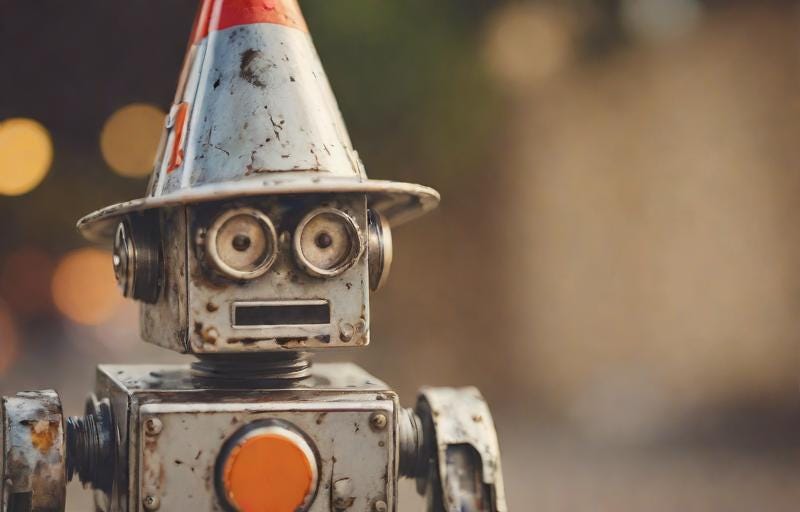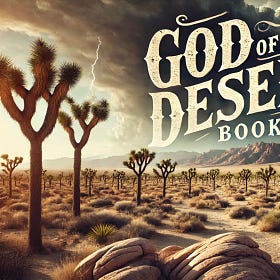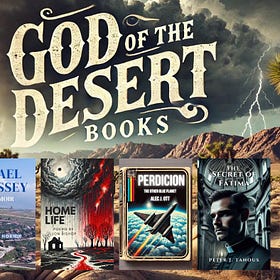How I Learned to Stop Worrying and Love the Artificial Intelligence
It's time for writers and creatives to get on board and figure out how this new technology can help us.
Back in December, I conducted a little quasi-scientific experiment about artificial intelligence. I presented the results in this post:
Just how smart was the AI of December 2023? Not very. I posed a bunch of questions to it on the one subject that I know about more deeply than any other human on the planet: my own writing career. I thought picking a subject more obscure than well-documented history could show whether it was reliable or not.
And after analyzing all of its answers, I gave it a D. A whole lot of the stuff it gave me was just wrong. It was saying that I wrote for publications that I never did.
The AI of this time had one fatal flaw in particular: it could not search the internet. It had a knowledge base that would be updated every now and then, but it could not reach out to get real-time information.
This lack of reliability in facts and inability to access current information left me hesitant about using AI as much as I might have otherwise, because its potential utility and impressive qualities were still apparent. This was cool and fun and a potential tool, but as something to rely on, it just didn't seem to be there yet.
But I kept experimenting with it, knowing one thing for certain: it was not that smart yet, but very soon, it would be.
And that day has now arrived. ChatGPT has now solved my two primary objections.
First, it can now provide sources regarding where it gets its facts. And in general, from my own experiments with it, it seems more factually reliable now, including answering the kinds of questions from my previous post much more effectively and accurately.
Second, it can search the internet now! It is now at least as smart as a reasonably competent undergraduate who can access Google. Only it's easier and more versatile than Google, and its applications go far beyond just searching for information.
So I'm on board now with the "AI revolution" and exploring all the capabilities this new technology offers for writing, editing, publishing, researching, aiding my mystical practice, PTSD treatment, and especially creative work.
And it turns out that real scientists using an objective measure have now confirmed this rapid rise in intelligence among the machines:
I had become blasé about AI progress after my initial tests in February, because there was approximately zero IQ improvement since then.
This week, that all changed.
Specifically, o1 got 25 out of 35 IQ questions correct, far above what most humans get.
…
Contrary to one strand of conventional wisdom, AIs aren’t merely regurgitating words pulled out of an algorithm. Yes, they are fundamentally doing that — but predicting the next word gets so complex that logic and reasoning seem to arise out of the process of prediction. Is that maybe also the same process from which human higher-order intelligence originated from? Unclear, but there’s no doubt that seeing the dawn of AI intelligence is starting to give us some hypotheses about our own.
I upgraded to a premium account on ChatGPT a few months ago. I’ve started experimenting now with this o1 which is only in trial for subscribers. It’s quite the leap, demonstrating even greater sophistication from the GPT-4o that I’ve been using.
Things are starting to really accelerate here, people.
So I’ve started using ChatGPT all day, as I come across new problems that it might be able to help me solve.
I'll give two small, basic examples and then two bigger ones.
First, in much of my journalistic work, I'm dealing with congressional leaders regularly. It's a common thing for me to get a long list of congressmen supporting some bill, and to write about them, I'd need to manually format them properly in AP style, with parties and states, before including them in a story. Now I can just drop the list into ChatGPT and ask it to do it for me. Very tedious writing tasks like that can now be quickly and easily outsourced.
Second, here's something to try with your own writing. After you're done with a piece, no matter the subject, drop the whole text into ChatGPT and ask it for 20 alternate headlines than what you picked. Most of the time when I do this, the headline that I came up with myself will be the one I like most. But often, one of the headlines will offer a word or phrasing that's useful and inspires me to write something stronger.
Thus ChatGPT can essentially act as an easier, faster thesaurus and dictionary. Is this the best word for me to use here? What are some alternatives that could fit better? This word does mean what I think it does, right?
I find the AI tends to be best at helping me recall something that I already know but just can't remember all the details about. Or perhaps I don't trust that my memory of a word or a historical event or a person, etc. is correct. ChatGPT can simply confirm it.
Now, why not just use Google or Wikipedia for this, you might ask? Simple, because then you just get a list of sites. You have to choose which ones to look at yourself, and then you have to go and hunt for the information you want. ChatGPT puts exactly what you need right there in front of you.
It has much bigger applications too, though.
First, the time and cost-saving potential are incredible when it comes to creating artwork that looks great. See these two posts from the last two months to see what we’ve done with it:
Using AI, we are now able to create better artwork faster (and astronomically cheaper) than previously. And further, it’s more closely in line with what we want, rather than having to be filtered through another person who has to put in much greater time and effort to churn out new potential iterations of what could work.
Now, creating good artwork that you'll actually want to use still takes real work and time, too. It can take awhile to get the AI to really start rendering the exact result you’re looking for. It takes time to figure out what sorts of prompts and descriptions produce what you’re looking to make. The AI still makes a whole lot of often absurd mistakes. But give it enough time, and you'll soon see that the results it delivers can be truly stunning and exciting. Graphic designers are even incorporating AI into their own work, too, to save them time and help them explore different mock-ups more efficiently.
And it’s only going to keep getting stronger and stronger, faster and faster.
Second, having completed a fiction project now that I've worked on for years (more on that soon), I'm now starting to plan out and pick my next novel projects. I'm developing one for our
line of adventure books, and another for our line of mystery books, inspired by this piece that and I wrote here:
What I've been experimenting with is using ChatGPT to help me outline versions of these novels. Who will be the characters, and what roles will they play in the story? How can I track and lay out the protagonist's progress over the course of the Hero's Journey model?
If I'm writing a 100,000 word novel, how might I divide the story I've planned into chapters? What if we threw in a dozen supporting characters of varying importance and in different roles? What roles could each of them play in the story?
Which authors have written stories similar to this, whose work I should read? Should I consider emulating this literary style or that one?
The AI is only offering suggestions and helping organize my thoughts. I'm the one in charge of what I want the story to be, how I want to write it, and so on. These are the sorts of outlines that I could manually write slowly myself, but would doing so really be any different then having to manually put congresspeople in proper AP style?
Now the obvious objection here is something like, "Well, Dave, why not just have the AI write the whole damn book, then?"
To which I respond, "Well, why not have the AI kiss your wife? Why not have the AI play with your puppy? Why not have the AI summarize your kid's hockey game instead of you attending yourself?"
Is the answer not so obvious that it makes the question absurd?
I chose to become a writer when I was eight years old.
This life of writing all day gives me perpetual joy and a sense of purpose. I don't need AI to take that away from me.
But I will gladly welcome this new technology into my corner as a coach, an assistant, and a new inspiration so I can further grow in this profession which has provided so much meaning to this life.











Try this. Drop a piece into ChatGPT and ask it be rewritten in the style of Steinbeck. Then repeat it while asking it be rewritten in the style of Hemingway. The results are amazing.
I don't have a paid AI version but I also want to preserve my own authenticity and not have it replaced by the machine. I know all these are loaded terms but because I have no author whom I want to mimic, I do not want to "teach" AI to be me. May I say, I choose to be weirdly self? With a chance to be different today from tomorrow and day before today?